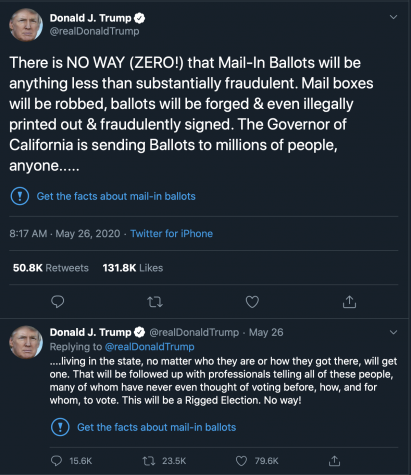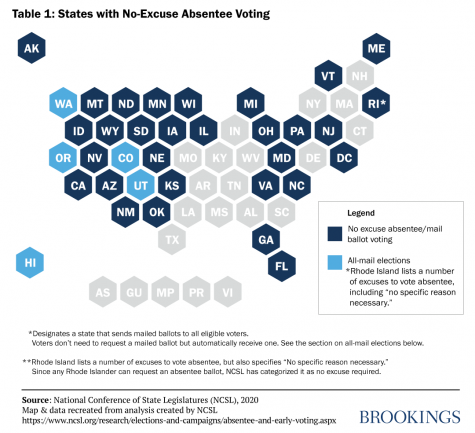In recent weeks, absentee voting (or voting by mail) has come under attack from President Trump.
“There is tremendous evidence of fraud whenever you have mail-in ballots,” the president said in an appearance in Arizona earlier in the week. Mr. Trump even tweeted about the fraudulent election that would surely come if we voted by mail, a tweet that was flagged by Twitter as misinformative.

Some conservative officials claim that absentee voting gives Democrats a better chance to win, despite researchers finding that it has no impact on partisan turnout or vote-share.
The president’s attacks on voting by mail have come off to some as hypocritical, considering that he has voted by mail as recently as this year in Florida’s primary.
Millions of Americans have already registered for absentee ballots for the upcoming election in November due largely to concerns over the coronavirus.
Even with the same number of polling stations open, it would be difficult to follow CDC guidelines regarding social distancing and sanitization. Several states’ primaries over the last few weeks have seen drastic reductions in polling locations, making it even more difficult to practice social distancing.
Kentucky usually has around 3,700 polling stations. In their primary election this week, that number was reduced to 170. Louisville, a city of over 600,000 people, had just one location available for citizens to cast votes.
The location was scheduled to close at 6 p.m. on Tuesday, but due to a large number of people still in line, was granted an extension to stay open.
This isn’t just happening in Kentucky. We have seen the same in states such as Georgia and New York, along with issues regarding broken machines.
Situations like these are providing more reasons for states to adopt absentee voting on a larger scale.
There are still many questions surrounding the availability of voting by mail and if it increases the likelihood of voter fraud.
How many states currently use mail-in voting?
The availability of absentee voting varies from state to state. It is determined by each state’s legislature.

Five states currently have all-mail elections (Hawaii, Washington, Oregon, Colorado and Utah). Another 20 states, including Florida, and Washington D.C. allow absentee voting without having to provide an excuse to do so.
In states where no-excuse absentee voting is not available, reasons allowed are often limited to being out of state on election day (i.e. service members on deployment and out-of-state college students) or those sick.
How does mail-in voting work?
The process begins with a citizen calling their local supervisor of elections or going to their website to register for a mail-in ballot. Identity verification is required and can include name, address, date of birth, driver’s license number and the last four digits of your social security number.
After receiving the request, local authorities send a ballot to the home address given. Along with the ballot is a security envelope to keep the votes cast private. The voter must also sign the outside of the envelope to certify that he or she is a registered voter.
Upon receipt of the ballot, election authorities check the name and signature of the voter to ensure that they are indeed registered and that they are casting a ballot from the address they are registered to. On Election Day, these votes are then counted and added to the results.
Does voting by mail increase fraud?
Research done by the Brennan Center for Justice at New York University shows no evidence that mail ballots increases electoral fraud. The research cited security measures including multiple forms of identity verification at each stage of the process, bar codes to keep track of ballot processing and post-election audits, among others.
Just because there is no evidence that mail fraud increases, however, does not mean that it does not occur occasionally.
For example, North Carolina Republicans in 2018 were cited for election fraud involving mail-in ballots. A campaign staffer for Mark Harris in the state’s Ninth Congressional District was found guilty of mishandling ballots and directing others to engage in election fraud.
There is also the occasional issue of duplicate voting, when one person uses residence in multiple states to cast multiple votes. This happened with Democrat Wendy Rosen in 2012 who withdrew her name from the ticket for Maryland’s First Congressional district after being accused of casting votes in both Florida and Maryland.
One common argument those opposed to absentee voting use is that people are likely to cast a vote for a dead person who was registered. This may sound plausible, but it would be a high-risk, low-reward endeavor.
To carry out this process, one would have to go through multiple steps:
Firstly, the person attempting fraud would have to know a dead person who was registered to vote when they were alive.
They would then have to apply for a mail-in ballot in the deceased’s name to be sent to the would-be fraud’s address. This means they would likely have to re-register the deceased to a new address and need to know information such as the dead person’s date of birth, last four digits of their social security number and even their driver’s license number.
Know what their signature looked like well enough to forge it. Some envelopes are chosen to verify that the signature of the person casting the ballot matches the signature of the person who registered to vote.
There is also the possibility that the person’s death is already on file at the election office through occasional audits of social security registries.
All of this would have to be done in order to cast a single vote. Additionally, punishments are severe, going as high as five years in prison and a $5,000 fine, further deterring would-be frauds.
For a sitting president to say that voting by mail will lead to a “substantially fraudulent” election is irresponsibly misleading at best. At worst, it is potentially dangerous to the democratic institutions on which this country was founded.
Refusing citizens the right to vote by mail in the middle of a pandemic when polling locations are significantly reduced not only has the chance to further the spread of the virus, but it will also likely disenfranchise millions deciding to prioritize personal and public health.
__
For more information or news tips, or if you see an error in this story or have any compliments or concerns, contact editor@unfspinnaker.com.











